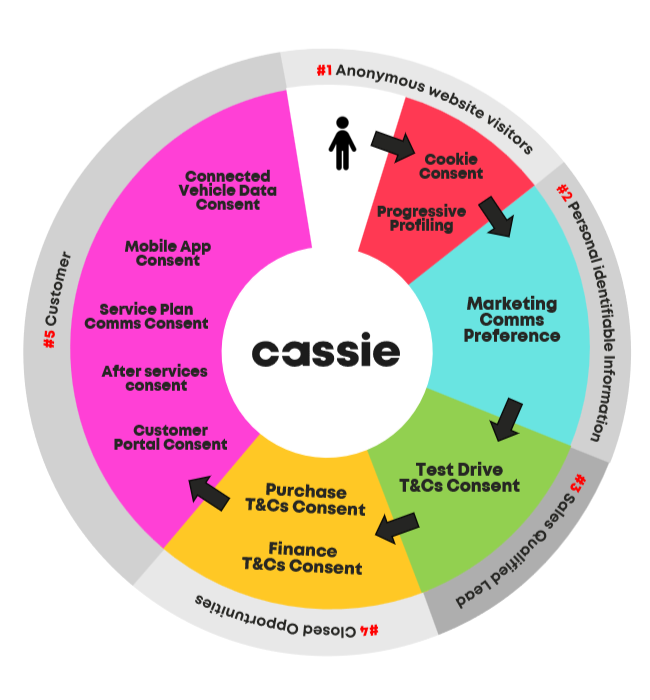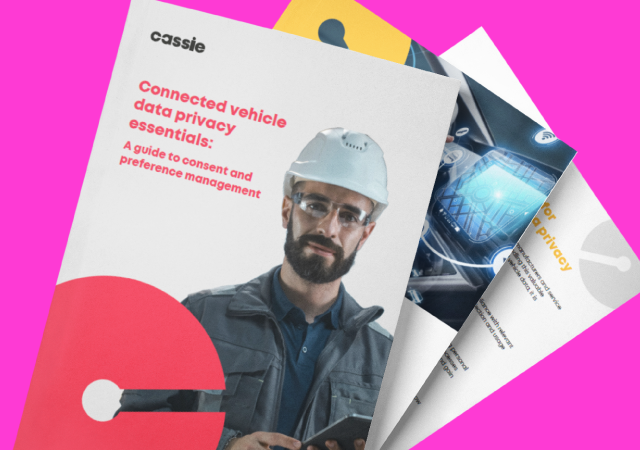Unlocking customer loyalty through vehicle data
Posted: July 29, 2023
Data privacy and vehicle data security are paramount concerns, and the automotive industry finds itself at a crossroads, particularly in building and maintaining customer loyalty. Original Equipment Manufacturers (OEM) face an ever-evolving set of challenges in the car manufacturing sector. It’s no longer enough to simply build innovative vehicles; now, the key to success is ensuring that your customers have unwavering trust in your data handling practices.
This data encompasses everything from engine performance metrics to driver preferences, from geolocation data to payment information. While this wealth of data holds immense potential for improving products, services, and safety, it also presents a critical question: How can OEMs strike the delicate balance between harnessing this data for innovation and respecting the privacy and preferences of their customers?
In this blog, we will explore data management and the pivotal role consent and preference management solutions play in the automotive industry. We’ll review how CMPs help OEMs navigate the complex terrain of data privacy regulations and enable them to leverage customer data to enhance the driving experience, ensure safety and quality, and strengthen customer relationships.
Personalized product and service delivery
With customer consent, the OEM can collect and analyze data to tailor products and services to individual preferences. For example, data on a driver’s past vehicle preferences, driving habits, and service history can be used to recommend and customize offerings. This personalization enhances the driving experience and increases customer satisfaction and loyalty as drivers receive products and services that align with their specific needs and preferences.
Enhanced safety and quality assurance
Vehicle-related data, including Vehicle Identification Numbers (VINs), service histories, and geolocation information, is critical in ensuring that vehicles perform optimally and adhere to stringent safety and quality standards. By continuously monitoring this data, the OEM can identify potential issues proactively, schedule maintenance or repairs, and even implement safety improvements through software updates. This proactive approach not only improves vehicle safety but also enhances the overall reputation and trustworthiness of the OEM.
Communication and notifications
Collected data can be used to communicate with drivers effectively. For instance, when a vehicle recall is necessary, the OEM can promptly notify affected drivers, providing detailed information about the issue and instructions for resolution. Similarly, software updates and maintenance reminders can be communicated in a timely manner, ensuring that drivers are aware of important developments and can take necessary actions to keep their vehicles in optimal condition. This proactive communication builds trust and reinforces the OEM’s commitment to driver safety and satisfaction.
Eligibility verification
Personal data is utilized to verify eligibility for loyalty programs, discounts, and other incentives. The OEM can offer exclusive benefits to eligible drivers by cross-referencing collected data with program requirements. This enhances customer loyalty and engagement, as drivers feel valued and rewarded for their ongoing relationship with the OEM. Moreover, it encourages continued brand loyalty and repeat business.
Innovation and development
Data fuels innovation by providing insights into customer preferences and usage patterns. For example, data on how drivers use their vehicles, such as commuting habits or preferred driving modes, can inform the development of cutting-edge offerings like autonomous driving technology and car-sharing solutions. This data-driven innovation positions the OEM as an industry leader, attracting tech-savvy customers and ensuring the company’s relevance in a rapidly evolving automotive landscape.
Customer insights and marketing
Demographic insights and commercial preferences enable the OEM to comprehensively understand customers. By analyzing this data, the OEM can segment its customer base, target specific demographics with tailored marketing campaigns, and develop products that cater to identified preferences. This improves sales and revenue and enhances customer satisfaction as drivers receive offerings that align with their interests and needs.
Biometric and physiological data for safety services
Biometric and physiological data, when gathered for safety services such as driver monitoring systems, play a pivotal role in enhancing road safety. For instance, monitoring a driver’s biometric data can help detect signs of fatigue or impairment, prompting real-time safety interventions like alerts or adjustments to vehicle settings. This proactive approach to safety ensures that drivers remain alert and responsive, reducing the risk of accidents and enhancing overall road safety.
Relationship management
Data is used to manage relationships with drivers, third parties, and investor services. Effective relationship management fosters trust, collaboration, and partnerships. For example, by sharing anonymized and aggregated data with third parties, the OEM can forge collaborations that benefit both drivers and the company. Additionally, investor services can leverage data to make informed investment decisions, supporting the long-term growth and stability of the OEM.
Regulatory compliance
Data collection and management are essential for regulatory compliance. By implementing a consent and preference management solution, the OEM can ensure that it adheres to data privacy laws and industry regulations. This mitigates the risk of legal issues and fines and demonstrates the company’s commitment to responsible data handling and privacy protection.
Payment and transaction processing
Payment information, including credit card numbers and expiration dates, is securely managed for transactions. Implementing robust data security measures for payment processing safeguards financial data, protects drivers from fraud, and maintains the trust and confidence of customers. This secure payment processing system ensures smooth and reliable financial transactions between the OEM and its customers.
Fraud detection and prevention
Data collection and analysis are crucial for the detection and prevention of fraud and other illicit activities. By continuously monitoring data for unusual patterns or discrepancies, the OEM can identify and respond to fraudulent activities promptly. This proactive approach safeguards both the individual’s and the company’s integrity, preserving trust and brand reputation.
Customer retention
By respecting customer preferences and using data responsibly, the OEM can maintain strong customer relationships and improve customer retention rates. When drivers feel that their data is handled carefully and used to enhance their experience, they are likelier to remain loyal to the brand, purchase additional products or services, and recommend the OEM to others. This, in turn, contributes to long-term business success and sustainability.

Centralized user journey consent communications
Cassie allows you to:
- Put customer preferences at the heart of your business
- Connect consent across all business, third-party platforms and channels
- Communicate with customers on their terms
- Ensure compliance by default
- Create a single source of truth
By ensuring data privacy compliance, you can instill a sense of security in your customers, assuring them that their data is handled with the utmost care. This keeps you on the right side of regulatory requirements and cultivates trust—an invaluable asset in today’s competitive landscape.
Simultaneously, by leveraging this data for personalized experiences, OEMs engage customers on a deeper level. When drivers feel their preferences and needs are understood and catered to, they form lasting, more ROI-driven brand loyalty; this loyalty, grounded in genuine care and tailored experiences, drives your long-term success.
The path forward lies in the harmonious blend of data privacy and personalized engagement; it’s a journey that leads to satisfied customers, innovative products, and a future where your OEM brand thrives on the trust and loyalty of those who share the road with you.

